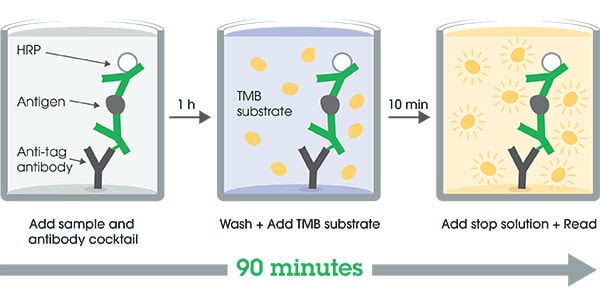Mouse Arginase 1 ELISA Kit (ab269541)
Key features and details
- One-wash 90 minute protocol
- Sensitivity: 2.02 pg/ml
- Range: 7.81 pg/ml - 500 pg/ml
- Sample type: Cell Lysate, Cit plasma, EDTA Plasma, Hep Plasma, Serum
- Detection method: Colorimetric
- Assay type: Sandwich (quantitative)
- Reacts with: Mouse
Overview
-
Product name
Mouse Arginase 1 ELISA Kit
See all Liver Arginase kits -
Detection method
Colorimetric -
Precision
Intra-assay Sample n Mean SD CV% Serum 8 4.1% Inter-assay Sample n Mean SD CV% Serum 3 4.7% -
Sample type
Serum, Cell Lysate, Hep Plasma, EDTA Plasma, Cit plasma -
Assay type
Sandwich (quantitative) -
Sensitivity
2.02 pg/ml -
Range
7.81 pg/ml - 500 pg/ml -
Recovery
Sample specific recovery Sample type Average % Range Serum 99 83% - 111% Cell Lysate 111 106% - 118% Hep Plasma 95 82% - 102% EDTA Plasma 101 97% - 104% Cit plasma 106 101% - 113% -
Assay time
1h 30m -
Assay duration
One step assay -
Species reactivity
Reacts with: Mouse -
Product overview
Mouse Arginase 1 ELISA Kit (ab269541) is a single-wash 90 min sandwich ELISA designed for the quantitative measurement of Arginase 1 protein in edta plasma, hep plasma, serum, cit plasma, and cell lysate. It uses our proprietary SimpleStep ELISA® technology. Quantitate Mouse Arginase 1 with 2.02 pg/ml sensitivity.
SimpleStep ELISA® technology employs capture antibodies conjugated to an affinity tag that is recognized by the monoclonal antibody used to coat our SimpleStep ELISA® plates. This approach to sandwich ELISA allows the formation of the antibody-analyte sandwich complex in a single step, significantly reducing assay time. See the SimpleStep ELISA® protocol summary in the image section for further details. Our SimpleStep ELISA® technology provides several benefits:
- Single-wash protocol reduces assay time to 90 minutes or less
- High sensitivity, specificity and reproducibility from superior antibodies
- Fully validated in biological samples
- 96-wells plate breakable into 12 x 8 wells stripsA 384-well SimpleStep ELISA® microplate (ab203359) is available to use as an alternative to the 96-well microplate provided with SimpleStep ELISA® kits.
-
Notes
Arginase is a key element of the urea cycle involving the conversion of L-arginine to urea and L-ornithine, which is further metabolized into metabolites that drive collagen synthesis and bioenergetic pathways critical for cell proliferation. Arginine metabolism is a critical regulator of innate and adaptive immune responses, involved in an antimicrobial effector pathway carried out by polymorphonuclear granulocytes (PMN). During PMN apoptosis, arginine is depleted in the microenvironment leading to suppressed T cell and natural killer cell proliferation and cytokine secretion. Arginase also plays a key role in human sexual response in smooth muscle tissue.
Abcam has not and does not intend to apply for the REACH Authorisation of customers’ uses of products that contain European Authorisation list (Annex XIV) substances.
It is the responsibility of our customers to check the necessity of application of REACH Authorisation, and any other relevant authorisations, for their intended uses. -
Platform
Pre-coated microplate (12 x 8 well strips)
Properties
-
Storage instructions
Store at +4°C. Please refer to protocols. -
Components 1 x 96 tests 10X Mouse Arginase1 Capture Antibody 1 x 600µl 10X Mouse Arginase1 Detector Antibody 1 x 600µl 10X Wash Buffer PT (ab206977) 1 x 20ml 5X Cell Extraction Buffer PTR (ab193970) 1 x 10ml Antibody Diluent CPR 1 x 6ml Mouse Arginase1 Lyophilized Recombinant Protein 2 vials Plate Seals 1 unit Sample Diluent NS (ab193972) 1 x 50ml SimpleStep Pre-Coated 96-Well Microplate (ab206978) 1 unit Stop Solution 1 x 12ml TMB Development Solution 1 x 12ml -
Research areas
-
Pathway
Nitrogen metabolism; urea cycle; L-ornithine and urea from L-arginine: step 1/1. -
Involvement in disease
Defects in ARG1 are the cause of argininemia (ARGIN) [MIM:207800]; also known as hyperargininemia. Argininemia is a rare autosomal recessive disorder of the urea cycle. Arginine is elevated in the blood and cerebrospinal fluid, and periodic hyperammonemia occurs. Clinical manifestations include developmental delay, seizures, mental retardation, hypotonia, ataxia, progressive spastic quadriplegia. -
Sequence similarities
Belongs to the arginase family. -
Cellular localization
Cytoplasm. - Information by UniProt
-
Alternative names
- A I
- Al
- ARG 1
see all -
Database links
- Entrez Gene: 11846 Mouse
- SwissProt: Q61176 Mouse
- Unigene: 154144 Mouse
Images
-
SimpleStep ELISA technology allows the formation of the antibody-antigen complex in one single step, reducing assay time to 90 minutes. Add samples or standards and antibody mix to wells all at once, incubate, wash, and add your final substrate. See protocol for a detailed step-by-step guide.
-
The Arginase1 standard curve was prepared as described in Section 10. Raw data values are shown in the table. Background-subtracted data values (mean +/- SD) are graphed.
-
The concentrations of Arginase1 were measured in duplicates, interpolated from the Arginase1 standard curves and corrected for sample dilution. Undiluted samples are as follows: serum 1: 40, plasma (citrate) 1: 40, plasma (heparin) 1: 20, and plasma (EDTA) 1: 20. The interpolated dilution factor corrected values are plotted (mean +/- SD, n=2). The mean Arginase1 concentration was determined to be 11.61 ng/mL in serum, 11.86 ng/mL in plasma (citrate), 9.37 ng/mL in plasma (heparin), and 8.70 ng/mL in plasma (EDTA).
-
 Interpolated concentrations of native Arginase1 in mouse liver homogenate extract samples based on a 0.25 µg/mL extract load.
Interpolated concentrations of native Arginase1 in mouse liver homogenate extract samples based on a 0.25 µg/mL extract load.The concentrations of Arginase1 were measured in duplicate and interpolated from the Arginase1 standard curve and corrected for sample dilution. The interpolated dilution factor corrected values are plotted (mean +/- SD, n=2). The mean Arginase1 concentration was determined to be 636.63 pg/mL in 0.25 µg/mL liver homogenate extract.
-
To learn more about the advantages of recombinant antibodies see here.














